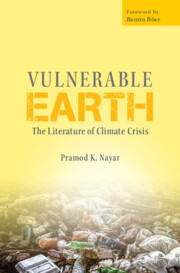Preface
Published online by Cambridge University Press: 30 April 2024
Summary
This book examines the proverbial tip of the (now-vanishing, climatologically speaking) iceberg, the literature of climate crisis, in terms of four discrete but interrelated themes. It employs for this purpose a considerable body of textual material, from fiction to memoirs, from the late twentieth to the early twenty-first century, weighted more towards the latter. It cites from this material extensively, often even as block quotes, in order to demonstrate rather than illustrate the textual archive and imagination of climate crisis. I have picked texts from all over the world, mainly to see overlaps and intersections, and this has, admittedly, elided historical specificities of, say, the tradition of African ecological literature or Native American texts on the theme. Admitting to a certain kind of universalization of the discourse of environmentalism, the book stays within the ambit of such a risky stance in order to speak planet rather than region or country. Thus, while the employment of texts from everywhere evidences a global concern with planetary precarity, individual cultures and bioregionalisms have different priorities and problems that need to be acknowledged – but this book does not attempt that. Also, domains such as animal trafficking, organ trade and biocapitalism that have informed the genre of ecological literature and ecocriticism as well as genres like petrofiction do not come in for any sustained attention in this book, which already grew to be more voluminous than was expected. Debates around the idea of the wilderness or ‘ecotopia’ that are current and exemplified in novels like Diane Cook's The New Wilderness (2020) or the fiction of Becky Chambers (Psalm for the Wild-Built, 2021) are also excluded. It also does not examine the pedagogic imperatives when teaching cli-fi – Stephen Siperstein, Shane Hall and Stephanie LeMenager's Teaching Climate Change in the Humanities (2017) does the job brilliantly – or debates around stewardship and care, which Rachel Carnell and Chris Mounsey's (eds.) Stewardship and the Future of the Planet: Promise and Paradox (2022) examines so effectively.
But ‘tis enough, ‘twill serve.
- Type
- Chapter
- Information
- Vulnerable EarthThe Literature of Climate Crisis, pp. ix - xPublisher: Cambridge University PressPrint publication year: 2024



